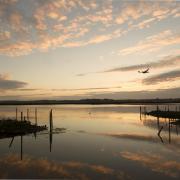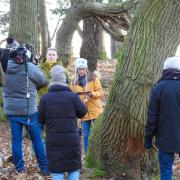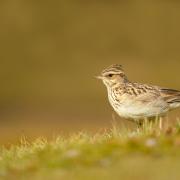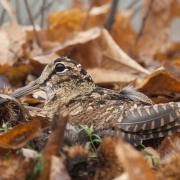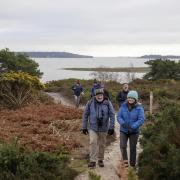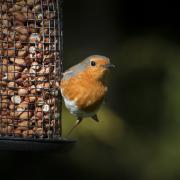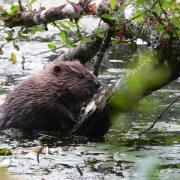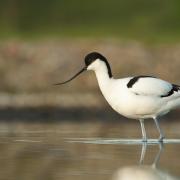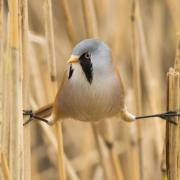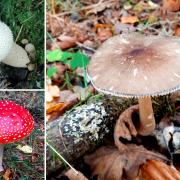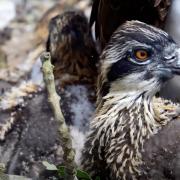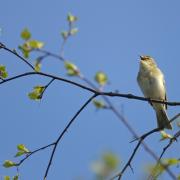As summer emerges, the RSPB's Emma Foulger heads out into the wildlife garden of Lyn Pullen and discovers the joy of wildlife watching in your own back yard
As summer emerges, the RSPB's Emma Foulger heads out into the wildlife garden of Lyn Pullen and discovers the joy of wildlife watching in your own back yard
I'm not very good in the garden. Standing here with Lyn Pullen looking at her wonderful variety of plants, the hum of insects and busy skies just a few feet above our heads (she needs air traffic control for these sparrows), I can only think of my very small square of almost artificially bright green grass. Having watched the decline in wildlife since she was a child, Lyn was determined to create a haven for nature on her doorstep. Butterflies are her passion and as she talks about the garden you get a sense of the enjoyment and excitement it brings through all the seasons.
Before we walk around, Lyn points to a photo on the wall. This is what the garden was like 10 years ago she tells me, and suddenly I feel heartened as I see the familiar bright green grass. I feel hope!
Lyn acknowledges that she was in a favourable spot when she set out to create her wildlife garden. "It's a large plot in a rural situation and this makes it easier to attract wildlife," she says. "When we first came here I had one pair of blackbirds and that was it." She has now counted 20 different types of butterfly and 24 different types of bird.
Lyn gardens for wildlife, organically, using peat-free compost, and waters the garden from water butts. I ask what she does about slugs: "Swear a lot!" she laughs. "I use physical barriers like fleece and I also use plastic collars (cut from plastic bottles)."
"Look," she says, and on a grassy bank a big furry bumblebee is feasting on the sunny yellow of a dandelion. "I always leave dandelions; early-flowering plants are so important to insects and butterflies," she says, as we wander over a grassy path to a large flowerbed full of dead stalks. "I don't cut anything back during the winter months but leave it as protection for birds, insects, and newts during the cold months. It's vital."
As we pass a mass of ivy, Lyn says, "It's great cover, thick and deep and I often come out at night and listen to the sounds of the slugs and snails in it!"
Overhead I hear the happy chatter of a goldfinch in flight and Lyn is pointing to the spiky teasels waving in the breeze. "These are lovely plants," she enthuses.
"In flower, butterflies and bees take the nectar and the goldfinches love the seeds."
We stop and sit by her pond, created in memory of her father-in-law. No wildlife garden would be complete without a pond. Lyn shows me the frogspawn covering the surface. "If you watch it for a while you will see a tail wiggle," and sure enough two or three tadpoles make a first bid for freedom. Occasionally the whole frogspawn quivers. "It's the newts feeding on it," says Lyn, explaining nature's food chain in action. "When we first put the pond in we had dragonflies the first year, a few newts the second year and frogs the following year. It was exciting seeing it get better and better for wildlife."
Out through the thick hedge we go, and into the veg patch which is full of the promise of raspberries, peas, runner beans and lettuce. To the side of the garden are two plastic trays. "Shhhh," Lyn whispers, lifting one up, and there curled on what Lyn tells me is a vole nest, is a beautiful slow worm. He eyes us suspiciously but does not attempt to move. She has often seen voles asleep in their nests too.
As I leave, Lyn says, "All this can be scaled down for a smaller garden and you will be amazed by the wildlife you attract." Time to start letting my garden live a little, I think, and bring it to life.
Share with us what wildlife you have in your own garden. Tell us about it on our forum at www.dorsetmagazine.co.uk.
Inspired? Why not find out more about the wildlife around you and get down to the RSPB's Springwatch family event at Radipole Lake Visitor Centre in Weymouth on 6 and 7 June, 10am-3pm.
The RSPB is the UK charity working to secure a healthy environment for birds and wildlife, helping to create a better world for us all. If you would like to become a member contact the South West regional office on (01392) 432691.



